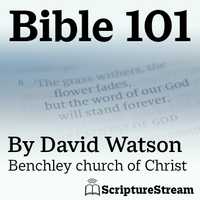Introduction
- Matthew 27:5; Luke 10:37; John 13:27 – Picking random verses in the Bible is not a good way to study!
- It’s easy to make mistakes by quoting scriptures out of context.
Who is speaking, writing, or talking?
- Psalms 14:1 – “there is no God”
- This is what the fool says!
- Romans 3:8 – “let us do evil that good may come”
- Job 4:18 – “against His angels He charges error”
- This is what Eliphaz is theorizing. In Job 42:7, Eliphaz is rebuked by God for not speaking rightly!
Who is being addressed?
-
Matthew 10:8 – “Heal the sick, raise the dead, cleanse the lepers …”
- Jesus was addressing the twelve apostles. This message was specific to them.
-
Luke 23:43 – “today you shall be with Me in Paradise”
-
So, is baptism not required?
-
See Luke 23:39-42. Jesus was not yet dead, so no one could be baptized into His death. Baptism for remission of sins was not yet in force.
-
-
Psalm 150:3 – “Praise Him with trumpet sound”
- Is instrumental music authorized? This was written under the Old Covenant when instrumental music was authorized. See II Chronicles 29:25-26.
How is a word or phrase being used?
- “do not become children” (I Corinthians 4:20) vs. “become like children” (Matthew 18:3)
- Different aspects of children are being discussed here.
- “God so loved the world” (John 3:16)
“God who made the world” (Acts 17:24)
“Do not love the world” (I John 2:15) - “How are you fallen from Heaven, O Lucifer?” (Isaiah 14:12, NKJV)
- Compare Luke 10:17-18. Lucifer was referring to the evil king of Babylon. Jesus was referring to Satan being defeated.
What subject is under discussion?
- I Corinthians 2:9 – “All that God has prepared for those who love Him.”
